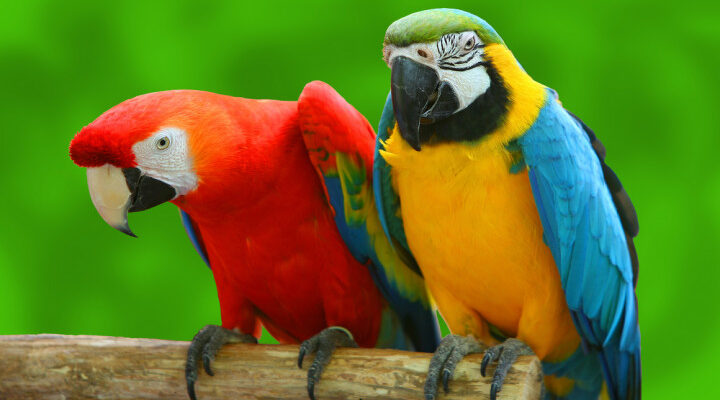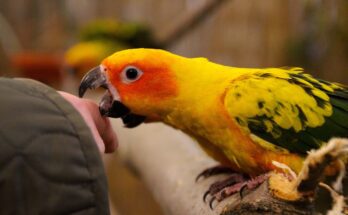Birds are among the most intelligent pets, and some of them have the unique ability to mimic human speech. Known as talking birds, these feathered friends can learn words, phrases, and even songs—making them exciting companions for pet owners.
If you’ve ever dreamed of owning a bird that can say “hello” when you walk in the door, this guide is for you. We’ll explore which birds talk, why they do it, and how to train your bird to talk—all in a way that’s simple for beginners to understand.
1. What Are Talking Birds?
Talking birds are species capable of imitating human sounds, words, and phrases. Unlike humans, they don’t understand language the way we do, but they mimic sounds from their environment.
Some parrots, for example, can learn dozens—even hundreds—of words over time. This talent makes them popular pets for people who want a feathered friend with personality.
2. Why Do Birds Talk?
Birds in the wild use vocalizations to:
- Communicate with their flock
- Attract mates
- Warn of danger
- Bond with family members
When raised as pets, they see their human owners as part of their flock. Talking becomes a way to bond, interact, and gain attention.
3. Best Talking Bird Species
Not all birds are great talkers. Here are some of the most popular species known for their talking ability:
1. African Grey Parrot
- Considered the best talker among birds
- Can learn 100+ words and understand context
- Highly intelligent and social
2. Budgerigar (Budgie/Parakeet)
- Small but talented talkers
- Can learn short words and phrases
- Easy to train, especially when young
3. Amazon Parrots
- Known for clear speech and fun personalities
- Can mimic songs and conversations
- Very playful and affectionate
4. Cockatoos
- Not as advanced as African Greys, but still capable
- Can learn words and phrases with training
- Extremely affectionate and social
5. Indian Ringneck Parakeet
- Clear, high-pitched voice
- Picks up words easily
- Popular for beginner bird owners
👉 Each species has its own charm, but success depends on training, patience, and daily interaction.
4. How to Train a Bird to Talk
Training your bird to talk takes time and consistency. Here’s a step-by-step guide for beginners:
Step 1: Start Simple
Choose one or two short words like:
- “Hello”
- “Hi”
- Your bird’s name
Repeat them clearly and consistently.
Step 2: Use Repetition
Birds learn through repetition. Say the word every time you enter the room or feed them.
Step 3: Positive Reinforcement
Reward your bird with treats, praise, or head scratches when they attempt to mimic.
Step 4: Practice Daily
Keep sessions short (5–10 minutes) but consistent. Morning and evening practice works best.
Step 5: Be Patient
Some birds learn quickly, while others take weeks or months. Patience is key!
5. Tips to Encourage Talking
- Speak clearly and slowly: Birds mimic exactly what they hear.
- Use a happy tone: Birds respond better to cheerful voices.
- Limit distractions: Quiet environments make it easier to focus.
- Repeat daily routines: Use the same phrases at the same times.
- Play recordings: Some owners use voice recordings, but interaction works best.
6. Common Mistakes to Avoid
When teaching your bird to talk, avoid these beginner mistakes:
- Teaching aggressive words: Birds may repeat them at the wrong time.
- Too many words at once: Start small before building vocabulary.
- Neglecting training: Inconsistent practice slows progress.
- Getting frustrated: Birds sense negative energy and may stop learning.
7. Do Talking Birds Really Understand Words?
This is a common question. While birds don’t understand language like humans, some species (like African Greys) show signs of connecting words to meaning.
For example, a bird may say “hello” when someone enters, or “food” when hungry. It’s less about true language and more about association and mimicry.
8. Caring for Talking Birds
Talking birds need more than just training. To keep them healthy and happy:
- Provide a balanced diet (fruits, veggies, seeds, pellets)
- Ensure daily playtime and mental stimulation
- Give them chew toys for beak health
- Allow social interaction—they thrive on attention
- Visit an avian vet regularly
A healthy, happy bird is more likely to talk and engage with you.
Final Thoughts
Talking birds are truly special pets. They not only brighten your home with their colors and songs but also bring joy with their ability to mimic speech.
Remember: not all birds will talk, and that’s okay. Every bird has its own personality. With patience, love, and consistent training, your feathered friend may surprise you with words and phrases over time.





Для больших строительных проектов лучшим вариантом будет строительный крепеж оптом, чтобы сэкономить средства и времени.
является наиболее выгодным вариантом для крупных строительных проектов. Это позволяет оптимизировать процесс закупок. При этом, необходимо учитывать качество предлагаемых изделий .
Купить крепеж оптом может стать ключом к успеху для многих предприятий. Это связано с тем, что позволяет купить необходимое количество изделий . Кроме того, при оптовой покупке можно договориться о скидке .
Купить крепеж оптом является наиболее эффективным способом закупки. Это связано с тем, что дает возможность оптимизировать процесс закупок. При этом, важно учитывать качество предлагаемых изделий .
Купить крепеж оптом может стать ключом к успеху. Это связано с тем, что оптовая покупка снижает затраты . Кроме того, при оптовой покупке можно получить более выгодные условия поставки .
Купить крепеж оптом позволяет сэкономить средства . Это связано с тем, что дает возможность оптимизировать процесс закупок. При этом, следует выбирать надежного поставщика.
Купить крепеж оптом является лучшим решением для крупных проектов . Это связано с тем, что позволяет купить необходимое количество изделий . Кроме того, можно насладиться большим выбором товаров.
Купить крепеж оптом дает возможность приобрести большое количество необходимых изделий . Это связано с тем, что оптовая покупка снижает цену за единицу . При этом, следует сравнивать цены в разных магазинах.
Купить крепеж оптом может стать ключом к успеху. Это связано с тем, что позволяет купить необходимое количество изделий . Кроме того, можно насладиться большим выбором товаров .
Постройте свой идеальный каркасный дом под ключ и наслаждайтесь комфортом и современными технологиями!
Несмотря на множество преимуществ, каркасные дома имеют и свои минусы.
Для больших строительных проектов лучшим вариантом будет купить крепеж оптом, чтобы сэкономить средства и времени.
является наиболее выгодным вариантом для крупных строительных проектов. Это позволяет получить необходимые материалы в большом количестве . При этом, важно выбирать надежного поставщика .
Купить крепеж оптом является лучшим решением для крупных проектов . Это связано с тем, что оптовая покупка снижает стоимость . Кроме того, можно получить более выгодные условия поставки .
Купить крепеж оптом является наиболее эффективным способом закупки. Это связано с тем, что оптовая покупка снижает цену за единицу . При этом, необходимо сравнивать цены в разных магазинах .
Купить крепеж оптом может стать ключом к успеху. Это связано с тем, что дает возможность сократить расходы. Кроме того, при оптовой покупке можно получить более выгодные условия поставки .
Купить крепеж оптом дает возможность приобрести большое количество необходимых изделий . Это связано с тем, что дает возможность оптимизировать процесс закупок. При этом, важно учитывать качество предлагаемых изделий .
Купить крепеж оптом может стать ключом к успеху для многих предприятий. Это связано с тем, что оптовая покупка снижает стоимость . Кроме того, можно насладиться большим выбором товаров.
Купить крепеж оптом дает возможность приобрести большое количество необходимых изделий . Это связано с тем, что оптовая покупка снижает цену за единицу . При этом, необходимо учитывать качество предлагаемых изделий .
Купить крепеж оптом является лучшим решением для крупных проектов . Это связано с тем, что оптовая покупка снижает затраты . Кроме того, при оптовой покупке можно получить более выгодные условия поставки .
Постройте свой идеальный каркасный дом под ключ спб и наслаждайтесь комфортом и современными технологиями!
Среди современных строительных технологий каркасный дом занимает лидирующие позиции.
Для реализации крупномасштабных строительных проектов необходимо болт с фланцем в больших количествах.
Приобретение крепежных элементов в большом количестве может быть очень выгодным для бизнеса . Это связано с тем, что оптовые цены обычно ниже розничных. Крепеж найти можно в каждом строительном магазине, но цена может быть не вполне удовлетворительной . Поэтому, найти хорошего поставщика является важнейшим фактором. Учитывая разнообразие крепежа, важно выбрать поставщика, который предлагает широкий ассортимент продукции .
Купить крепеж оптом дает возможность сэкономить значительную сумму денег, поскольку оптовые цены как правило ниже розничных . Это особенно важно для крупных проектов, где каждый рубль на счету. Закупка крепежа оптом дает возможность планировать работу без перебоев. Кроме того, оптовые покупки крепежа часто сопровождаются дополнительными бонусами и скидками от поставщиков .
Поиск поставщика крепежа может занять много времени, если не знать, где его искать . Одним из наиболее эффективных способов найти поставщика является использование интернета . Кроме того, Для поиска поставщика крепежа можно также посетить строительные выставки, где представлены многие компании-поставщики.
В заключение стоит отметить, что купить крепеж оптом — это очень выгодное вложение средств для любого бизнеса . Это связано с тем, что Купить крепеж оптом означает также обеспечить себя качественными материалами на долгий период . Поэтому, Оптовая покупка крепежных элементов — это один из шагов к успешному и прибыльному бизнесу .
Для тех, кто ищет экологически чистый и экономичный вариант, элитные авто купить становится всё более популярным решением.
Электромобили завоевывают мир своим элегантным дизайном и стремительным ускорением . Многие люди спрашивают себя, стоит ли покупать электромобиль . Электромобили имеют множество преимуществ, включая экономию денег и снижение вредного воздействия на окружающую среду .
Приобретение электромобиля может быть шагом к более устойчивому будущему . Некоторые государства ввели программы поддержки продаж электромобилей .
Электромобили имеют ряд преимуществ, включая снижение уровня шума и минимизацию выбросов вредных веществ . Одним из главных преимуществ электромобилей является экономия средств на топливо . Электромобили обеспечивают надежность и долговечность.
Электромобили можно заряжать дома или на общественных зарядных станциях . Некоторые компании предлагают услуги по замене батарей .
При покупке электромобиля следует учитывать такие факторы, как дальность хода и мощность . Максимальная дальность хода на одной зарядке является важным параметром . При покупке электромобиля следует учитывать такие факторы, как цена и доступные скидки .
Существует множество вариантов электромобилей от различных брендов. При приобретении электромобиля следует учитывать такие факторы, как уровень комфорта и безопасность.
Электромобиль может стать идеальным выбором для любого, кто ценит экологичность и комфорт. Электромобили представляют собой лучший вариант для тех, кто заботится о будущем планеты.
При покупке электромобиля следует рассмотреть все факторы и выбрать лучший вариант для себя.
Для реализации крупномасштабных строительных проектов необходимо крепежи в больших количествах.
Купить крепеж оптом — это решение, которое может существенно снизить затраты на строительные или производственные проекты . Это связано с тем, что оптовые цены обычно ниже розничных. Крепежные элементы используются практически во всех отраслях промышленности, начиная от строительства и заканчивая автомобильной промышленностью . Поэтому, найти хорошего поставщика является важнейшим фактором. Самое главное — это найти поставщика, который предлагает качественный крепеж по разумной цене .
Приобретая крепежные элементы в большом количестве, можно существенно снизить затраты. Это особенно важно для крупных проектов, где каждый рубль на счету. Закупка крепежа оптом дает возможность планировать работу без перебоев. Кроме того, Оптовые покупатели крепежа могут рассчитывать на индивидуальный подход и льготные условия от продавцов.
Для начала поиска поставщика крепежных элементов стоит обратиться к рекомендациям от коллег или почитать отзывы в интернете. Поиск в интернете позволяет быстро сравнить предложения разных поставщиков и выбрать лучшее . Кроме того, Участие в отраслевых мероприятиях дает возможность лично пообщаться с представителями компаний и оценить их предложения .
В заключение стоит отметить, что купить крепеж оптом — это очень выгодное вложение средств для любого бизнеса . Это связано с тем, что оптовые покупки позволяют не только сэкономить, но и обеспечить стабильность поставок . Поэтому, поиск надежного поставщика и приобретение крепежа оптом должно быть одним из ключевых направлений для любого руководителя проекта или владельца бизнеса .
Для тех, кто ищет экологически чистый и экономичный вариант, гибридные автомобили купить в москве становится всё более популярным решением.
Электромобили завоевывают мир своим элегантным дизайном и стремительным ускорением . Многие люди интересуются вопросом приобретения электромобиля . Электромобили представляют собой современный и экологически чистый вариант транспорта.
Покупка электромобиля может стать правильным решением для тех, кто заботится об окружающей среде . Многие страны мира уже предлагают льготы и скидки на покупку электромобилей .
Электромобили имеют ряд преимуществ, включая снижение уровня шума и минимизацию выбросов вредных веществ . Одним из главных преимуществ электромобилей является экономия средств на топливо . Электромобили также требуют меньше технического обслуживания, чем традиционные автомобили .
Электромобили предлагают гибкость и удобство зарядки. Многие производители электромобилей также предлагают варианты аренды батарей .
При выборе электромобиля важно учитывать несколько факторов . Дальность хода электромобиля является одним из ключевых факторов . Кроме того, необходимо учитывать стоимость электромобиля и возможные льготы .
На рынке представлены различные модели электромобилей от разных производителей . При приобретении электромобиля следует учитывать такие факторы, как уровень комфорта и безопасность.
Приобретение электромобиля может стать шагом к более устойчивому будущему и обеспечить экономию средств . Многие эксперты рекомендуют покупать электромобили как более экологически чистый и экономичный вариант .
Перед покупкой электромобиля следует тщательно изучить все варианты и выбрать тот, который лучше всего соответствует вашим потребностям .
Необходимо обратить внимание на площадь, количество комнат и другие характеристики.
планы каркасных домов планы каркасных домов.
купить крепеж оптом – надежное решение для ваших строительных нужд.
При выборе крепежа нужно учитывать множество факторов: от материала до условий эксплуатации и нагрузки.
купить крепеж оптом – надежное решение для ваших строительных нужд.
Существует множество видов крепежа, каждый из которых предназначен для определенных целей.